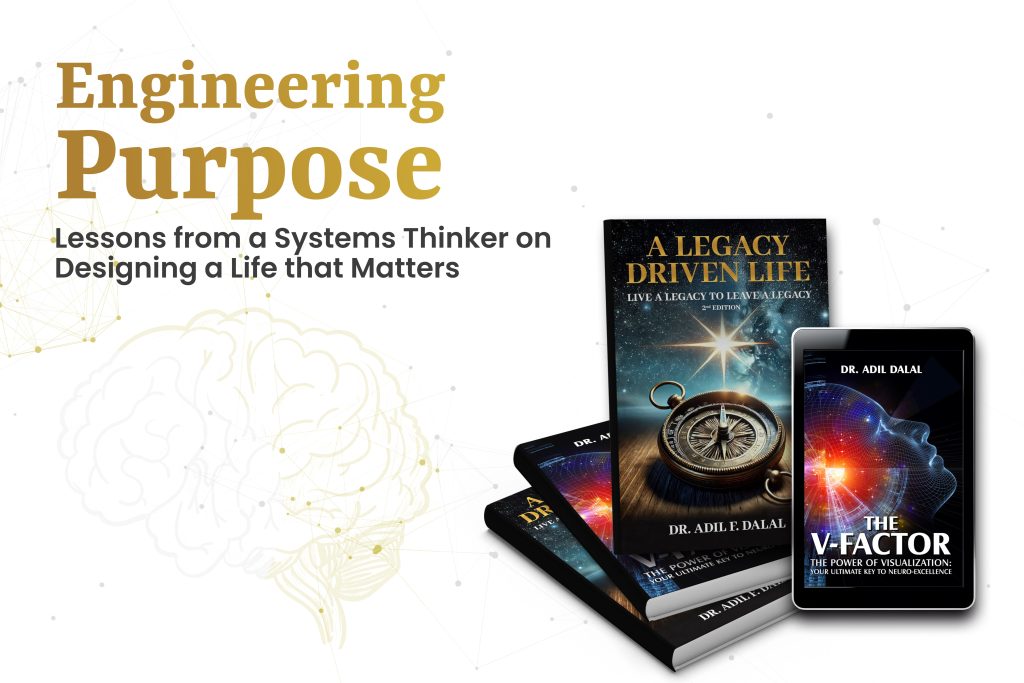
Let’s be honest: life can feel like a chaotic mess sometimes.
We plan, we pivot, we hustle, we burn out, and then we repeat the cycle, hoping something clicks. But what if the problem isn’t the effort? What if the issue is that we’re approaching life like it’s supposed to “work itself out” instead of something we’re meant to design?
That’s where Dr. Adil Dalal’s approach hit me like a lightbulb moment.
Here’s a professional who spent years helping businesses worldwide cut waste, streamline operations, and unlock insane levels of efficiency using systems thinking. We’re talking about Lean, Six Sigma, and Kaizen, the heavy hitters of business transformation. But then he applied those same principles to his life. Yep. Not quarterly KPIs or production floors. Actual, everyday life.
And the wild thing is? It makes so much sense.
From the Factory Floor to Finding Purpose
Dr. Dalal isn’t your typical executive coach. He’s got this calm, analytical energy like the guy who’ll walk into a crisis and start quietly mapping out a solution while everyone else is panicking. After decades of process improvement, he realized something: businesses weren’t the only things that were broken. People were too stressed, burned out, disengaged, drifting.
Then he began posing another type of query: “What if we applied systems thinking to something deeper, like identity, goals, and purpose?” The concept was not to make your life into a spreadsheet. It was to treat your development with the same attention and goal you would apply in creating a world-class business. Suddenly, a personal metamorphosis was a process rather than just a vague idea.
Start with the Root Cause
In Six Sigma, before fixing a problem, you dig for its root cause. You don’t just slap a Band-Aid on symptoms. You ask “why” over and over until you hit the actual issue. And Dr. Dalal says we need to do the same in life.
Feeling stuck in your career? Don’t just assume it’s your job title. Maybe the deeper issue is misalignment with your values. Constantly drained at the end of the day? The cause might not be your workload. It may be due to poor boundaries or a lack of meaningful work.
Dr. Dalal encourages people to map it out. Literally, grab a notebook and start tracing the patterns. When did the frustration start? What triggered it? Keep asking “why” until you’re past the noise and into the real stuff.
Life Kaizen: Small Tweaks, Big Shifts
If you’ve heard of Kaizen, you probably associate it with Japanese factories or Toyota’s rise to global dominance. But at its core, Kaizen is just about continuous improvement, incremental changes, and incessant learning.
Dr. Dalal discusses using “life Kaizen” to gradually shift habits instead of trying to overhaul everything in one go. Want to improve your health? Don’t jump into a 75-day fitness challenge that burns you out by day five. Instead, try tweaking one thing: drink more water, stretch in the morning, and walk after lunch.
He tells a story about a client who felt totally unfulfilled in her leadership role. Instead of quitting immediately, she employed Kaizen to make small shifts, delegate more effectively, carve out time for her passion projects, and have honest conversations with her team. Within months, her entire perspective changed. Same job, different energy.
Systems Over Goals
One of the most refreshing things Dr. Dalal teaches is the idea that goals are overrated if you don’t have systems to support them.
Think about it. Anyone can set a goal, such as “I want to write a book” or “I want to be a better parent.” But what happens next? Without a system, a repeatable process, you’re relying on motivation, which is like trying to run a marathon on Red Bull. It fades fast.
Systems are what carry you when motivation dips. A writing schedule, a morning check-in with your kids, and a weekly review of your time are the structure that makes goals real.
Dr. Dalal breaks it down beautifully in his workshops: purpose –> process –> progress. You align with your purpose, build a process that supports it, and track your progress not by perfection but by consistency.
Engineering a Legacy, Not Just a Life
Here’s where things get deep. For Dr. Dalal, all of this isn’t just about optimization. It’s about legacy.
In his book A Legacy Driven Life, he challenges readers to look beyond careers, titles, and timelines. What will people remember you for? What kind of imprint are you leaving behind?
And again, he brings systems thinking into the mix. He exhorts readers to engineer that influence and design deliberately rather than fantasize vaguely about “making a difference.” You can truly create a legacy by incorporating mentoring, creative work, community service, or family traditions into your daily life. It has nothing to do with fame or blockbuster writing. It’s about matching your time and effort to what truly matters.
My Takeaway: Live Like a Systems Thinker
I’ll be honest: I’ve tried every life-planning method out there. Vision boards, habit trackers, and self-help books are stacked on my nightstand. Some worked. Most didn’t stick. But what I’ve learned from Dr. Dalal’s work is that purpose isn’t some magical thing you discover one day. It’s something you engineer, piece by piece.
You figure out what matters most. You trace your patterns and ask the tough “why” questions. You make small tweaks that build into meaningful change. And you stop waiting for motivation and start relying on systems that move with you.
It’s less dramatic, sure. But it’s way more sustainable.
And maybe that’s the whole point. Life isn’t something we find. It’s something we design.
